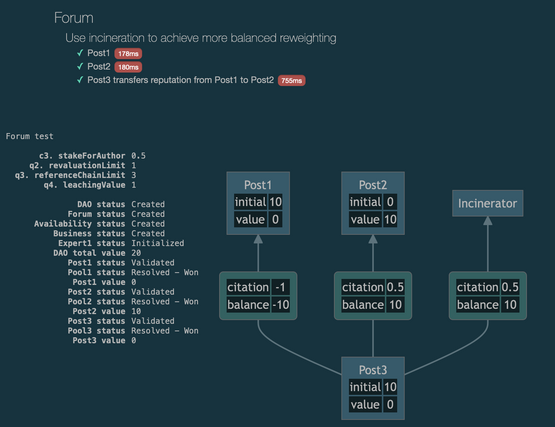Forum reference mechanisms: Difference between revisions
m (Craig Calcaterra moved page Forum Reference Mechanism to Forum reference mechanisms) |
|||
| Line 12: | Line 12: | ||
In this case we can imagine governance concluding that Post1 was bad and Post2 was good. Then governance makes Post3 with power 10 REP and validates it. Then in the displayed example the Forum WDAG has been revaluated, i.e., re-weighted. This is the primitive that allows governance to review previous judgements and correct mistakes made in the past. The incinerator is a complication that allows this re-weighting action to keep the total graph weight constant. | In this case we can imagine governance concluding that Post1 was bad and Post2 was good. Then governance makes Post3 with power 10 REP and validates it. Then in the displayed example the Forum WDAG has been revaluated, i.e., re-weighted. This is the primitive that allows governance to review previous judgements and correct mistakes made in the past. The incinerator is a complication that allows this re-weighting action to keep the total graph weight constant. | ||
This isn't the only way to achieve re-weighting. | This isn't the only way to achieve re-weighting. Every approach has its own advantages and disadvantages. This approach encourages stability because it is particularly inefficient. E.g., it costs 10 to move 10, and 10 REP is destroyed. So a serious effort is required to reweight the Forum to correct past mistakes. This effort requires the sacrifice of 10 REP on the part of those who make the change (the 10 REP from Post3 was governance value). | ||
== Absolute redistribution bounded by the value of a post == | |||
Another complete set of primitives exist which are more restrictive. For example, an even more restrictive governance protocol would only allow the sum of absolute values of redistribution to be less than the value of a post. In this case, for instance, a DAO would use Post3 to only leach 10 and incinerate it. Then a Post4 is required to donate 10 to Post2. With this restriction it would take 20 REP and two posts to achieve the same redistribution that 10 REP completes with one post as demonstrated in the previously displayed figure. | |||
This same limitation could be enforced under the previous hard protocol primitives by instituting a soft protocol requiring it in all posts. Therefore we consider the previous primitives as a better default for DAO governance. | |||
== Governmental fiat == | |||
Consider another system that a DAO may choose is much less inefficient, but also less stable. We can alternatively program primitives that give governance complete control by fiat. Specifically, a DAO may choose to make a primitive which allows any redistribution desired without any cost in REP. In this case, as long as an arbitrary redistribution was validated it could be achieved if the DAO allowed that primitive. | |||
In general, this is much more dangerous than the previous examples of primitives, because one validated post could put all the value of the entire WDAG into any new account the poster wishes. However, it would be extremely efficient if the DAO wishes to move quickly and trusts its governance. | |||
Revision as of 14:29, 26 March 2023
Governance examples
Transferring value from one post to another
The figure displayed illustrates a scheme for redistributing power from Post1 to Post2.
In this case we can imagine governance concluding that Post1 was bad and Post2 was good. Then governance makes Post3 with power 10 REP and validates it. Then in the displayed example the Forum WDAG has been revaluated, i.e., re-weighted. This is the primitive that allows governance to review previous judgements and correct mistakes made in the past. The incinerator is a complication that allows this re-weighting action to keep the total graph weight constant.
This isn't the only way to achieve re-weighting. Every approach has its own advantages and disadvantages. This approach encourages stability because it is particularly inefficient. E.g., it costs 10 to move 10, and 10 REP is destroyed. So a serious effort is required to reweight the Forum to correct past mistakes. This effort requires the sacrifice of 10 REP on the part of those who make the change (the 10 REP from Post3 was governance value).
Absolute redistribution bounded by the value of a post
Another complete set of primitives exist which are more restrictive. For example, an even more restrictive governance protocol would only allow the sum of absolute values of redistribution to be less than the value of a post. In this case, for instance, a DAO would use Post3 to only leach 10 and incinerate it. Then a Post4 is required to donate 10 to Post2. With this restriction it would take 20 REP and two posts to achieve the same redistribution that 10 REP completes with one post as demonstrated in the previously displayed figure.
This same limitation could be enforced under the previous hard protocol primitives by instituting a soft protocol requiring it in all posts. Therefore we consider the previous primitives as a better default for DAO governance.
Governmental fiat
Consider another system that a DAO may choose is much less inefficient, but also less stable. We can alternatively program primitives that give governance complete control by fiat. Specifically, a DAO may choose to make a primitive which allows any redistribution desired without any cost in REP. In this case, as long as an arbitrary redistribution was validated it could be achieved if the DAO allowed that primitive.
In general, this is much more dangerous than the previous examples of primitives, because one validated post could put all the value of the entire WDAG into any new account the poster wishes. However, it would be extremely efficient if the DAO wishes to move quickly and trusts its governance.
